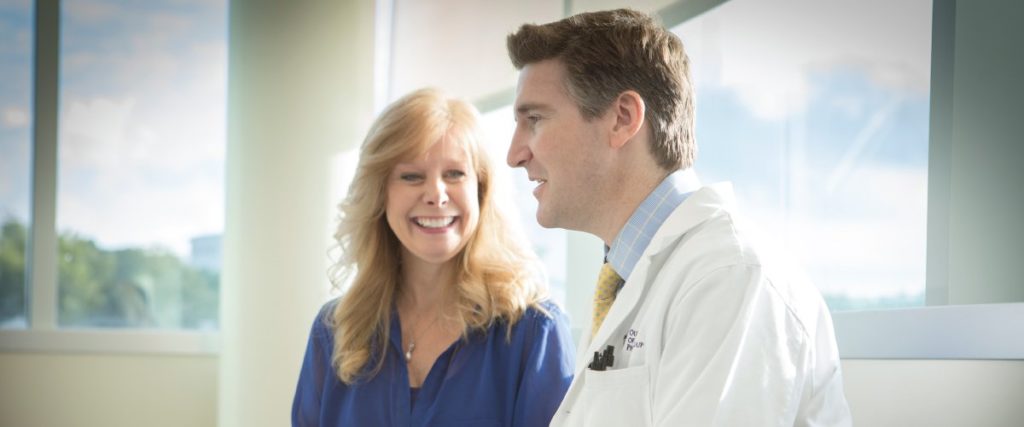Gastric Cancer
About
Gastric cancers, also known as stomach cancer, usually develop slowly over long periods of time. Before cancer develops, pre-cancerous changes often occur in the stomach’s inner lining. Depending on the location of where the gastric cancer begins, differing symptoms and outcomes are likely. The location of the cancer can also determine appropriate treatment options.
The American Cancer Society estimates that each year, more than 27,000 people (16,980 men and 10,620 women) in the U.S. are diagnosed with gastric cancer. However, the number of new cases of gastric cancer have decreased about 1.5% each year over the last 10 years. Gastric cancer mostly affects people 65-years-old or over.
Advanced Treatment
ROBOTIC SYSTEM
At Mary Bird Perkins – Our Lady of the Lake Cancer Center, surgeons use a sophisticated robotic platform to perform complex, minimally invasive surgery on gastric cancer patients. This robot helps surgeons avoid surrounding tissue to minimize and control bleeding, while its 3D vision shows more details. This robotic system makes it possible for surgeons to operate through one or a few small incisions, enhancing recovery time and significantly reducing post-operative complications. To learn more about this robotic system, click here.
Disease Site Team
Disease site teams, or multidisciplinary care teams, are specialists from each diagnostic, treatment and supportive care discipline working together in the same facility where state-of-the-art cancer treatment is given, and relevant research is conducted. Individuals diagnosed with gastric cancer have the benefit of a team of experts collaborating on every aspect of their care.
Screenings
Early detection in the form of screenings is often your best protection against cancer. Talk to your doctor about any risk factors or symptoms of gastric cancer you may have.
RISK FACTORS
Risk factors for gastric cancer include smoking, a diet high in salty and smoked food, diet low in fruits and vegetables, family history of gastric cancer, infection with Helicobacter pylori, long-term stomach inflammation, pernicious anemia or stomach polyps. Please talk to your doctor about any personal risk factors you may have, including any prior conditions you or someone in your immediate family has had.
SYMPTOMS
Some possible signs of gastric cancer include, fatigue, feeling bloated after eating, feeling full after eating small amounts of food, severe and persistent heartburn, severe indigestion that is always present, unexplained persistent nausea, stomach pain, persistent vomiting and unintentional weight loss. If you experience any of these symptoms, please talk to your doctor.
Source: cancer.org

Patient Stories
ELIZABETH FRANKLIN, STOMACH CANCER SURVIVOR
After visiting several well-known healthcare facilities in various states and getting the same feedback from all of them, Elizabeth Franklin was told that a cancerous tumor in her stomach was inoperable. After going to the Cancer Center, Dr. Lyons told Elizabeth that he was confident he could immediately and safely remove her tumor.Clinical Trials
Clinical trials are research studies help test new ways to prevent, detect, diagnose or treat diseases, including gastric cancer. A drug must be part of a clinical trial before the FDA will approve it to be put on the market. Oncology clinical trials are conducted in order to test new drugs or a new combination of drug treatments, new surgery and radiation therapies and new medical devices.
Every cancer center patient is evaluated for participation in a clinical trial. Those who meet the criteria to participate in clinical research receive a standard of care treatment, but with the added benefit of a trial that may enhance their outcomes.
If interested in volunteering to participate in a clinical research trial, or if you have concerns about the conduct of clinical research, please contact the Clinical Research office at (225) 215-1353, or by email at clinicalresearch@marybird.com.
There are currently no active pancreatic clinical trials. Please check back as we are continuously opening new studies.
Additional Support
- American Cancer Society: The American Cancer Society website contains information on many aspects of cancer care geared toward patients and caregivers.
- National Cancer Institute: National Cancer Institute is a federal program that is part of the National Institutes of Health. It has resources and information for patients and caregivers which is based on scientific research.
